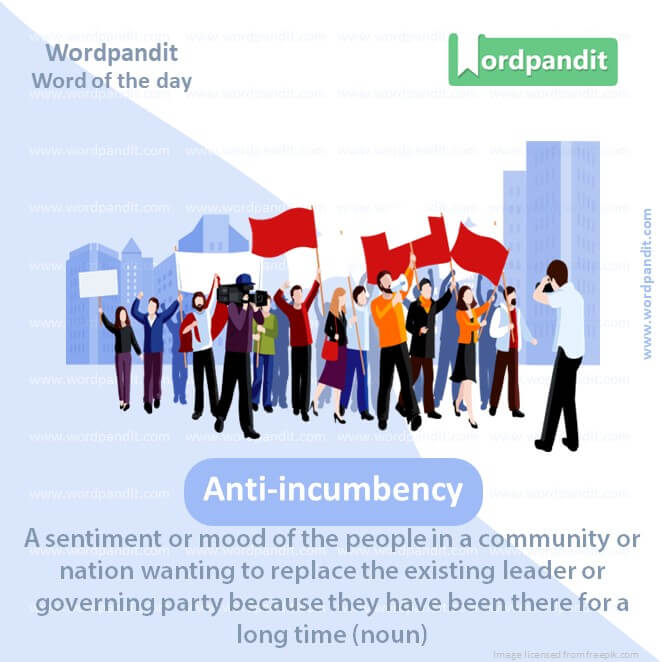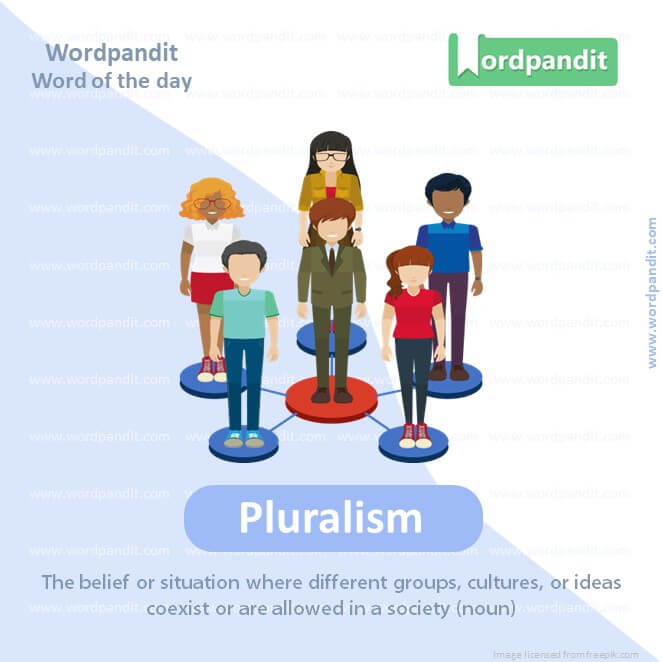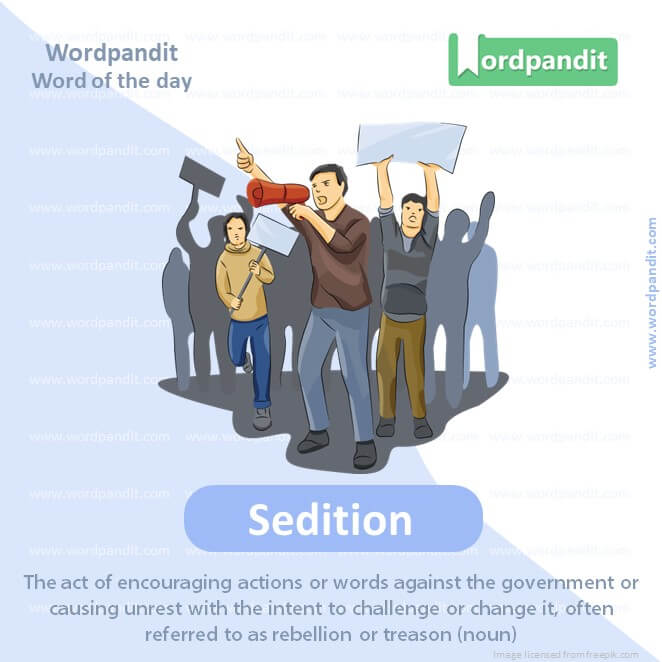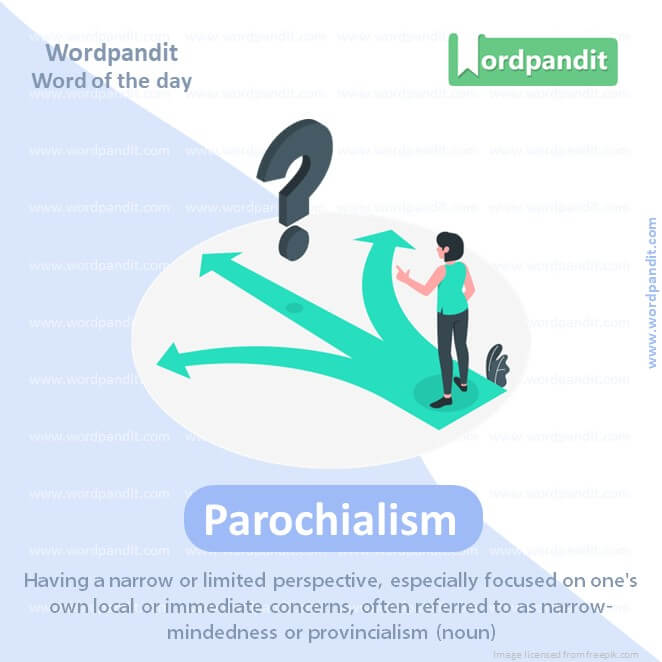Daily Vocabulary Words: List of Daily Used Words in Leading Indian Newspapers
Hi there. Welcome to this special section @ Wordpandit. Our endeavour here is straightforward: highlighting daily vocabulary words that you would come across in leading newspapers in the country. We have included the following newspapers in our selection:
• The Times of India
• The Economic Times
• Hindustan Times
• Mint
• Indian Express
We are putting in extensive work to develop your vocabulary. All you have to do is be regular with this section and check out this post daily. This is your repository of commonly used words; essentially, we are posting a list of daily used words. Hence, this has significant practical application as it teaches you words that are commonly used in leading publications mentioned above.
Visit the website daily to learn words from leading Indian newspapers.

WORD-1: Anti-incumbency
CONTEXT: Anti-incumbency, also known as changeover mood or replacement urge, has been brewing under the surface against the Gehlot government yet the state BJP has been too insipid and faction-ridden to capitalize…
SOURCE: Times of India
EXPLANATORY PARAGRAPH: Imagine you have a toy that you’ve played with for a long time, and now you want a new one. Sometimes, when a leader has been in charge for a while, people want to see someone new in that position. This feeling of wanting a change is called anti-incumbency.
MEANING: A sentiment or mood of the people in a community or nation wanting to replace the existing leader or governing party because they have been there for a long time (noun).
PRONUNCIATION: an-tee in-KUM-ben-see
USAGE EXAMPLES:
1. The mayor lost the election due to a strong wave of anti-incumbency.
2. Anti-incumbency sentiments often arise when the ruling party fails to deliver on promises.
3. The long-standing leader sensed anti-incumbency and decided not to run for another term.
4. The opposition party tried to capitalize on the anti-incumbency mood among the voters.

WORD-2: Acclimated
CONTEXT: Indian companies can develop an ecosystem of overseas talent that is acclimated to working in India, adapted and adjusted to the local culture and environment.
SOURCE: Indian Express
EXPLANATORY PARAGRAPH: Have you ever felt really cold when you first jump into a swimming pool, but after a while, it doesn’t feel so cold anymore? That’s because your body gets used to it. When we get used to something new or different, like a new place or weather, we say we have “acclimated.”
MEANING: Becoming accustomed to a new environment or situation (verb).
PRONUNCIATION: uh-KLIM-ay-ted
SYNONYMS: Adapted, adjusted, accustomed, habituated, familiarized, conformed, settled
USAGE EXAMPLES:
1. It took a month for him to get acclimated to the new city.
2. After a week in the mountains, she acclimated to the higher altitudes.
3. They quickly acclimated to the hot weather during their vacation.
4. Animals can also get acclimated to different habitats.

WORD-3: Pluralism
CONTEXT: India, known for its rich cultural tapestry, stands as a testament to the power of pluralism, diversity, multiculturalism, and inclusivity, where myriad religions and ethnicities coexist.
SOURCE: Hindustan Times
EXPLANATORY PARAGRAPH: Imagine you have a box of crayons with lots of different colors. Each color is different, but they all fit together in one box. Pluralism is like that box of crayons. It’s when people with different ideas, beliefs, and backgrounds live together in one place and respect each other.
MEANING: The belief or situation where different groups, cultures, or ideas coexist or are allowed in a society (noun).
PRONUNCIATION: PLOOR-uh-lizm
SYNONYMS: Diversity, multiculturalism, tolerance, inclusivity, multi-ethnicity, variedness, coexistence
USAGE EXAMPLES:
1. Pluralism is a cornerstone of democratic societies.
2. The city is known for its cultural pluralism and vibrant arts scene.
3. The festival celebrated the pluralism of the nation’s history.
4. She wrote a book on the challenges and strengths of religious pluralism.

WORD-4: Sedition
CONTEXT: The government’s decision to charge the activists with sedition, rebellion or treason, has drawn criticism from various quarters, questioning the basis and intent behind such a move.
SOURCE: Indian Express
EXPLANATORY PARAGRAPH: Let’s say you have a team, and someone in the team keeps saying things that make others want to go against the team leader. In big grown-up situations, when someone tries to make people go against their country’s leaders by saying or doing certain things, it’s called sedition.
MEANING: The act of encouraging actions or words against the government or causing unrest with the intent to challenge or change it, often referred to as rebellion or treason (noun).
PRONUNCIATION: seh-DISH-un
SYNONYMS: Rebellion, treason, mutiny, insurgence, revolt, subversion, agitation
USAGE EXAMPLES:
1. He was arrested and charged with sedition after his fiery speech.
2. The newspaper was accused of spreading sedition.
3. The activist clarified that her intent was never to incite sedition.
4. The law on sedition has been controversial in many countries.

WORD-5: Parochialism
CONTEXT: Political experts worry that regional parochialism, narrow-mindedness and provincialism, could undermine national integration, especially when identity-based politics takes precedence over developmental agendas.
SOURCE: Times of India
EXPLANATORY PARAGRAPH: Imagine if you only liked the toys from your own toy box and didn’t care about any other toys from your friends’ boxes. Parochialism is when people are only interested in what’s close to them and don’t want to know about the bigger world outside.
MEANING: Having a narrow or limited perspective, especially focused on one’s own local or immediate concerns, often referred to as narrow-mindedness or provincialism (noun).
PRONUNCIATION: puh-ROH-kee-ul-izm
SYNONYMS: Narrow-mindedness, provincialism, short-sightedness, insularity, localism, narrowness, small-mindedness
USAGE EXAMPLES:
1. His parochialism was evident when he showed no interest in world news.
2. The community, trying to avoid parochialism, invited speakers from various backgrounds.
3. She was criticized for her parochial views on global issues.
4. The debate highlighted the dangers of parochialism in modern society.
WORD-6: Ombudsman
CONTEXT: The appointment of the new banking ombudsman, mediator or intermediary, comes at a time when consumer complaints regarding digital transactions are on the rise.
SOURCE: Times of India
EXPLANATORY PARAGRAPH: Imagine you have a problem with a toy you bought, and you don’t know who to talk to. There might be a special person who helps solve problems between customers and the toy store. In the big world, when people have problems with some organizations, there’s a person called an “ombudsman” who helps sort things out.
MEANING: A person who investigates and tries to resolve complaints and problems between individuals and an organization or government, often referred to as a mediator or intermediary (noun).
PRONUNCIATION: AHM-budz-man
SYNONYMS: Mediator, intermediary, arbitrator, advocate, investigator, referee, go-between
USAGE EXAMPLES:
1. The bank has an ombudsman to address customer complaints.
2. If you’re unhappy with the public service, you can approach the ombudsman.
3. The ombudsman released a report on the complaints received last year.
4. She was grateful to the ombudsman for resolving her issue.
WORD-7: Retrospective
CONTEXT: The proposed retrospective tax law amendments have worried many foreign investors, who believe that such changes could deter future investments.
SOURCE: Hindustan Times
EXPLANATORY PARAGRAPH: Have you ever looked at old photos and remembered fun times from the past? A retrospective is like that. It’s a look back at someone’s work or events from the past.
MEANING: Looking back at or dealing with past events or situations, especially in arts, often referred to as a review or lookback (noun/adjective).
PRONUNCIATION: ret-roh-SPEK-tiv
SYNONYMS: Review, lookback, recap, reexamination, flashback, recapitulation, rearview
USAGE EXAMPLES:
1. The museum held a retrospective of the artist’s early works.
2. The documentary provided a retrospective look at the decade.
3. The book is a retrospective on the band’s career.
4. The event was a joyful retrospective of their school years.
WORD-8: Rapprochement
CONTEXT: Following a series of high-level talks, there seems to be a rapprochement, reconciliation or reunion, between the two neighboring nations, paving the way for increased trade and collaboration.
SOURCE: Times of India
EXPLANATORY PARAGRAPH: Imagine two friends who were upset with each other, but then they decide to make up and be friends again. Rapprochement is a fancy word for that: when two groups or countries decide to become friendly or closer after being distant or hostile.
MEANING: The establishment of friendlier relations between two parties, especially countries, after tension or disputes, often referred to as reconciliation or reunion (noun).
PRONUNCIATION: ra-PROSH-mawnt
SYNONYMS: Reconciliation, reunion, reconnection, detente, making up, harmonization, conciliation
USAGE EXAMPLES:
1. The rapprochement between the two nations was welcomed globally.
2. After years of rivalry, the companies found a point of rapprochement.
3. The summit aims at the rapprochement of eastern and western countries.
4. Cultural events often serve as avenues for rapprochement among diverse communities.
WORD-9: Extradition
CONTEXT: The extradition treaty, deportation or handover, between India and the United Kingdom came under the spotlight recently when a high-profile fugitive businessman was sent back to face charges in India.
SOURCE: Indian Express
EXPLANATORY PARAGRAPH: Imagine if someone took your toy and ran to another room to hide. You’d want them to be brought back to your room to return the toy, right? In the big world, when someone does something wrong in one country and runs away to another country, “extradition” is the process of getting them back to the first country to face consequences.
MEANING: The official process of delivering an individual, who is accused or convicted of a crime in one country, to the authorities of another country where they committed the crime or are wanted, often referred to as deportation or handover (noun).
PRONUNCIATION: ex-truh-DISH-un
SYNONYMS: Deportation, handover, transfer, return, repatriation, delivery, surrender
USAGE EXAMPLES:
1. The criminal faces extradition to his home country.
2. The treaty establishes the conditions for extradition between the two nations.
3. Her lawyers are fighting against her extradition.
4. The extradition process can be lengthy and complicated.
WORD-10: Emulated
CONTEXT: Congress successfully emulated, imitated or copied, was his grave insult to the victims of the Holocaust.
SOURCE: Indian Express
EXPLANATORY PARAGRAPH: Do you have someone you look up to and want to be like? Maybe a superhero or a big sibling? When you try to act or be like someone because you admire them, you’re “emulating” them.
MEANING: To imitate or try to be like someone or something, especially out of admiration, often referred to as imitated, copied, or mimicked (verb).
PRONUNCIATION: EM-yuh-lay-ted
SYNONYMS: Imitated, copied, mimicked, followed, replicated, matched, mirrored
USAGE EXAMPLES:
1. She emulated her favorite artist’s painting style.
2. Young athletes often emulated their sports heroes.
3. The software emulated the functions of the original device.
4. Many writers have emulated the classic authors in their works.
Vocabulary Words
When delving into the dynamic world of languages, the grandeur of ‘vocabulary words’ is all-encompassing. The importance of ‘vocabulary words’ in effective communication cannot be overstated; it’s these words that form the backdrop of any language, painting intricate pictures of thoughts and ideas.
Starting on the journey of learning ‘vocabulary words’, one should steer clear from rote memorization. The traditional structure of merely repeating words lacks the necessary context and application that actually embeds these words into your memory. To truly master the ‘vocabulary words’, one needs an integrated, immersive approach.
The first step towards mastering ‘vocabulary words’ is to engage with varied language mediums. Expanding beyond textbooks to read fiction, articles, blogs, and other forms of content not only diversifies your vocabulary but also acts as a mirror to reflect the practical application of these words. Essentially, you’re exposed to the words as they are commonly used, allowing you to truly understand their essence.
Empowering this journey, tech tools like language learning apps and memory-enhancing flashcards significantly aid in learning ‘vocabulary words’. These interactive tools provide a more engaging learning experience and hone word retention. Mnemonic devices, associating words with a unique story or visual image, enrich the process and make memory recall more efficient.
Practicing ‘vocabulary words’ by using them in day-to-day conversations exemplifies learning by doing. It also strengthens the neural pathways and improves overall word recall. This, coupled with regular revisions, ensures your grasp over ‘vocabulary words’ remains strong.
In conclusion, learning ‘vocabulary words’ is not just about adding words to your linguistic cupboard, but understanding their essence and utilizing them effectively. An inclusive approach to learning that combines diverse reading materials, technology tools, mnemonic devices and practice can really propel your mastery over ‘vocabulary words’. Remember, language is the bloodline of communication, and ‘vocabulary words’ are its heartbeat. ‘













